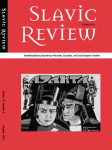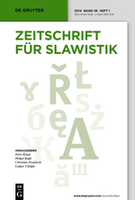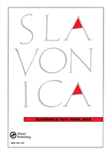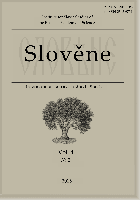
SLAVIC AND EAST EUROPEAN JOURNAL
Scope & Guideline
Diving into the Linguistic Riches of Slavic Languages
Introduction
Aims and Scopes
- Literary Analysis and Critique:
The journal provides in-depth analysis of literary works from Slavic and East European authors, exploring themes, narrative techniques, and cultural contexts. - Cultural Studies:
It encompasses studies of cultural phenomena, including folklore, arts, and the impact of historical events on contemporary cultural expressions. - Historical Perspectives:
Research often delves into historical contexts, examining the evolution of societies in the Slavic and East European regions, particularly through the lens of political changes. - Interdisciplinary Approaches:
The journal promotes interdisciplinary methodologies, integrating insights from sociology, anthropology, and political science to enrich the understanding of Slavic and East European studies. - Translation Studies:
There is a consistent focus on translation and its impact on the dissemination of literature and culture, highlighting the role of translators in shaping narratives. - Post-Colonial and Gender Studies:
Recent publications show an increasing interest in post-colonial perspectives and gender studies, analyzing how these frameworks apply to Slavic and East European contexts.
Trending and Emerging
- Queer Theory and Gender Studies:
There is a notable increase in research examining queer identities and gender dynamics within Slavic and East European literature and culture, reflecting broader global conversations. - Environmental and Spatial Studies:
Recent publications highlight the intersection of culture and environmental issues, examining how literature and art respond to ecological crises and urbanization. - Post-Socialist Studies:
Emerging themes focus on the cultural and political legacies of post-socialism, particularly in how they shape identities and narratives in contemporary literature. - Digital Humanities:
The integration of digital tools and methodologies in research is becoming more prevalent, with scholars exploring new ways to analyze texts and cultural artifacts. - Transnational Perspectives:
There is a growing trend towards transnational studies that explore connections and exchanges between Slavic and East European cultures and other global contexts.
Declining or Waning
- Cold War Narratives:
Research focused specifically on Cold War dynamics has decreased, as contemporary issues and historical perspectives gain more prominence in the journal's discourse. - Soviet Literature Exclusivity:
The exclusive focus on Soviet-era literary analysis appears to be waning, with broader cultural and literary contexts now taking precedence. - Traditional Historical Accounts:
Traditional historical narratives are increasingly being complemented or replaced by more nuanced studies that consider multiple perspectives and voices. - Ethnic Identity Studies:
While still present, studies centered solely on ethnic identity within Slavic and East European contexts have seen a decline, as intersectional approaches become more favored.
Similar Journals

SLAVIC REVIEW
Illuminating the Tapestry of Slavic Heritage.SLAVIC REVIEW, published by Cambridge University Press, is a prominent academic journal that delves into the rich tapestry of Slavic studies, focusing on the cultural, historical, and social dimensions of Slavic regions. With an ISSN of 0037-6779 and an E-ISSN of 2325-7784, this journal holds a significant position within the academic community, ranking in the Q2 category of Arts and Humanities (miscellaneous) and achieving a Q1 rating in Cultural Studies as of 2023. Notably, the journal has consistent relevance in the field, as evidenced by its Scopus rankings—Rank #260 in Cultural Studies and Rank #204 in Miscellaneous Arts and Humanities. Since its converged years starting from 1966 up to the present, SLAVIC REVIEW has been an essential resource for researchers, professionals, and students aiming to deepen their understanding of Slavic cultures. While it operates on a traditional subscription model and does not provide open access, the journal remains a vital platform for pioneering research and critical discourse in Slavic studies.

ZEITSCHRIFT FUR SLAWISTIK
Innovating Perspectives in Slavic Cultural StudiesZEITSCHRIFT FUR SLAWISTIK, published by WALTER DE GRUYTER GMBH, is a renowned journal focusing on Slavic studies, encompassing various fields such as cultural studies, linguistics, and literary theory. With its ISSN 0044-3506, this distinguished journal has been a significant contribution to the academic community since its inception in 1956, continuing to disseminate valuable research until 2024. While maintaining a strong reputation within several academic categories, ZEITSCHRIFT FUR SLAWISTIK holds a Q3 ranking in Cultural Studies and Linguistics and Language, and a Q2 ranking in Literature and Literary Theory as of 2023. This positioning underscores the journal’s impact, particularly as it caters to an audience of researchers, professionals, and students invested in the rich tapestry of Slavic culture and language. Access to this journal is not open; however, its comprehensive articles are crucial for anyone aiming to explore and deepen their understanding of Slavic linguistic and literary traditions. The journal's work is essential in fostering cross-disciplinary dialogue and advancing scholarship in these vital areas.

SLAVONICA
Unveiling the Depths of Slavic Cultural NarrativesSLAVONICA is a distinguished academic journal dedicated to the exploration and analysis of Slavic studies, incorporating a wide array of cultural, historical, and linguistic perspectives. Published by Routledge Journals, Taylor & Francis Ltd, this journal serves as a critical platform for interdisciplinary scholarship, emphasizing the dynamic nature of Slavic cultures and languages. Though it currently does not offer Open Access, SLAVONICA is an important resource for researchers, professionals, and students seeking to engage with the latest academic discourse in the fields of Cultural Studies, History, Literature, and Linguistics, achieving a recognized place in the Q4 quartile across several categories as of 2023. With coverage spanning from 1994 to 2024, and its commitment to fostering academic inquiry, SLAVONICA plays a vital role in elevating the understanding of Slavic heritage and contemporary issues, making it essential reading for anyone interested in the complexities of this region.

Slovo
Navigating the Dynamic Landscapes of Slavic ScholarshipSlovo, published by the University College London, School of Slavonic & East European Studies, is a vital scholarly journal dedicated to the exploration of Slavic languages and cultures, as well as the broader social sciences and humanities. Established with a commitment to advancing academic discourse, Slovo serves as a platform for researchers, professionals, and students interested in the dynamic intersections of literature, history, and cultural studies within Slavic and Eastern European contexts. Although it holds a Q4 ranking in both the Arts and Humanities and Social Sciences categories, the journal’s emphasis on fresh perspectives often invites innovative contributions that challenge conventional narratives. While lacking an Open Access option, Slovo remains integral for those seeking to navigate its multifaceted terrain, ensuring that emerging scholars and established academics alike can engage with rigorous research from 2012 to 2023 and beyond. With its headquarters in London, United Kingdom, this journal not only reflects the rich heritage of its academic lineage but also fosters a vibrant community committed to the exploration of Slavic and East European studies.

Konstantinove Listy-Constantines Letters
Connecting the past with contemporary scholarship.Konstantinove Listy - Constantines Letters is a premier academic journal published by the Constantine Philosopher University in Nitra, Slovakia. With a focus on the interdisciplinary exploration of historical, philosophical, and religious studies, this journal has established itself as a significant platform for scholarly discourse since its inception in 2015. The journal's impressive rankings—Q1 in History and Religious Studies, along with Q2 in Philosophy—demonstrate its commitment to high-quality research, concurrent with its strong performance in Scopus rankings, placing it in the 80th percentile for both Religious Studies and History disciplines. As an integral part of the academic landscape, Konstantinove Listy invites researchers, professionals, and students alike to contribute to its mission of advancing knowledge and understanding in these vital fields. While the journal operates under traditional publishing, it is recognized for its accessibility and contribution to fostering a vibrant scholarly community.

Zbornik Matice Srpske za Slavistiku-Matica Srpska Journal of Slavic Studies
Bridging Cultures Through Slavic ScholarshipZbornik Matice Srpske za Slavistiku - Matica Srpska Journal of Slavic Studies, published by Matica Srpska in Serbia, is a prominent academic journal focusing on the diverse and rich field of Slavic studies. With an ISSN of 0352-5007 and a commitment to advancing knowledge in linguistics, literature, and cultural contexts, this journal serves as a vital resource for researchers, professionals, and students alike. Although designated as an open access journal, its significance is highlighted by its ranking in the lower quartiles of 2023 across various categories, including Q4 in Linguistics and Language and Q3 in Literature and Literary Theory. The journal's Scopus rankings further reflect its position, with a percentile of just 8th for Language and Linguistics. These factors underscore the journal's ongoing contribution to Slavic scholarship from 2019 to 2024, fostering dialogue and exploration in a field that remains crucial for understanding Eastern European cultures and languages.

Slovene-International Journal of Slavic Studies
Unlocking New Perspectives in Slavic StudiesThe Slovene-International Journal of Slavic Studies, published by the Russian Academy of Sciences, Institute of Slavic Studies, serves as a vital platform for scholarly discourse in the fields of Cultural Studies, History, Linguistics, and Religious Studies. Since its transition to Open Access in 2012, the journal has enriched academic dialogue, enabling wider circulation and accessibility of research findings. Based in the Russian Federation, the journal supports interdisciplinary approaches, inviting contributions that push the boundaries of traditional Slavic studies. With a commendable ranking in the Q3 quartile across multiple categories as of 2023 and respectable Scopus rankings, it stands out as a crucial resource for researchers and students alike, enhancing their understanding of Slavic and related cultural contexts. The journal's commitment to fostering international collaboration and dialogue positions it as an invaluable asset for anyone engaged in the complexities of Slavic studies.

Germanoslavica-Zeitschrift fur Germano-Slawische Studien
Cultivating Understanding at the Crossroads of CulturesGermanoslavica-Zeitschrift für Germano-Slawische Studien, published by the esteemed SLOVANSKY USTAV AKAD CESKE REPUBLIKY, serves as a pivotal platform for scholarly discourse in the fields of linguistics and literary studies. Since its inception in 2002, this journal has dedicated itself to exploring the intricate relationships between German and Slavic languages and literatures, fostering a greater understanding of this culturally rich intersection. With its publication indexed in Scopus and categorized in the Q4 quartile for Linguistics and Language as well as Literature and Literary Theory, it provides valuable insights at the junction of these disciplines. Although it currently does not have open access options, the journal's commitment to quality research ensures it remains a respected resource for researchers, professionals, and students alike. The journal’s dedication to advancing knowledge makes it an essential reference point for those investigating the complexities of Germano-Slavic interactions.

EUROPE-REVUE LITTERAIRE MENSUELLE
Navigating the Evolving Terrain of Literary CritiqueEUROPE-REVUE LITTERAIRE MENSUELLE, published by REVUE EUROPE, is a distinguished monthly journal centered on the exploration of literature and literary theory. Established in 1974 and continuing its dissemination of scholarly content through 2022, this journal delivers critical insights and analyses relevant to both contemporary and historical literary studies. With an ISSN of 0014-2751, it serves as an essential resource for researchers, professionals, and students interested in the evolving landscapes of literature. Although positioned in the Q4 category within literature and literary theory, as indicated by its 2023 Scopus rankings, the journal contributes significantly to the field through diverse scholarly articles, critiques, and thematic discussions, while also engaging with a broad spectrum of literary expressions across Europe. Despite the absence of open access, the journal’s commitment to fostering intellectual discourse in literature remains steadfast, making it a pivotal platform for diving into the depths of literary exploration.

Quaerendo-A Journal Devoted to Manuscripts and Printed Books
Fostering Discourse in Bibliographic HistoryQuaerendo: A Journal Devoted to Manuscripts and Printed Books, an esteemed publication by BRILL, serves as a critical platform for the exploration and scholarly examination of manuscripts, printed books, and bibliographic history. Established in 1971, this journal has consistently contributed to the fields of History and Library and Information Sciences, ranking in the 73rd percentile among Arts and Humanities History publications and the 34th percentile in Library and Information Sciences, as per Scopus rankings. Quaerendo offers researchers, professionals, and students insights into the significance of textual artifacts and their impact on cultural heritage. Although the journal operates under a traditional subscription model, its academic rigor and comprehensive reviews enhance its relevance and importance within the scholarly community. With issues spanning from 1971 to the present, it continues to attract contributions from leading experts, fostering an environment for scholarly discourse and innovation in the study of written heritage.